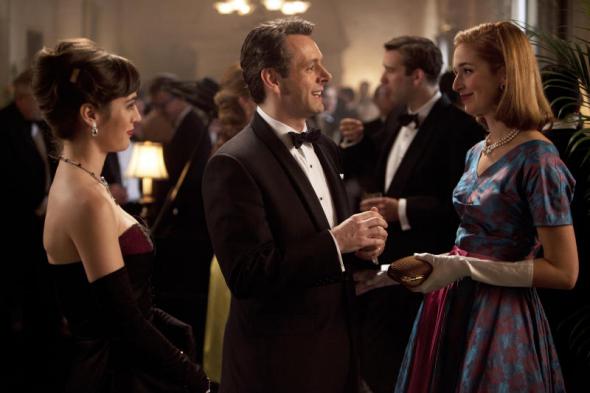On a recent episode of Masters of Sex—which wraps up its first season this Sunday—Dr. William Masters (Michael Sheen) did something awful. Again.
Virginia (Lizzy Caplan), his assistant in their ongoing study of human sexuality, volunteered to be filmed masturbating after their usual volunteer, Jane, quit. At the end of the hour, the good doctor surprised Virginia with a brown envelope filled with cash.
Virginia has been sleeping with her boss as part of the study, and she was expecting her long-awaited performance review. She opened it and gasped in disbelief. She’d already explained to him why Jane was uncomfortable: “Getting paid to show her naked body? To her mind only hookers and porn actors do that.” And yet, here he was, giving Virginia money for all the times they had sex—or as he puts it, “participated.”
Dick.
It’s moments like this—and many, many others—that have made Dr. Masters the least sympathetic of TV’s abundant crop of antiheroes. That’s quite a feat. The endless philandering and boozing of Don Draper became boring long ago—and Walter White, of course, was a conniving asshole who became increasingly odious as Breaking Bad wore on. Dexter and Tony Soprano were straight-up murderers. And yet somehow Dr. Masters is the one who makes me want to take a Silkwood shower.
He’s petty, undermining, not self-aware, emotionally abusive, distant, and outright mean to all of the women who will do anything to please and impress him, including his mother and his wife. He’s a jerk to the young doctor, Ethan (Nicholas D’Agosto), and a blackmail artist who uses his knowledge of the provost’s homosexuality to secure funding for his study—but then behaves like a complete hypocrite when it comes to including homosexuals in that study. I hate him.
And I’m certain it’s a principal reason why people aren’t as enamored of Masters of Sex as they would otherwise be. The acting, after all, is nuanced and a joy to behold. (Michael Sheen even got a Golden Globe nomination for his performance.) Watching Masters and Johnson and their merry band of fornicators upend the stuffy notions of the ’50s is titillating and fun and even eye-opening. But I am not the least bit interested in Dr. Masters as a human being.
How did the writers so completely turn off a TV audience clearly willing to root for horrible people?
Part of the problem is that they’ve painted him into a corner of pettiness: He starts out as a nasty piece of work. His fellow antiheroes were shown in a more sympathetic light early on. Dexter, a sociopathic serial killer, watched his mother be killed as a 3-year-old and spent a lifetime channeling his murderous impulses into killing only bad guys. (He’s fighting the good fight!) Don Draper, when we first meet him, is smooth and charming—and the writers are careful to show him talking (and listening) to an African-American waiter, expressing insecurity over his pitch for Lucky Strike. We also see him be somewhat decent to Peggy, while Pete Campbell sexually harasses her. At the beginning of Breaking Bad, of course, Walter White is a bumbling dork far too brilliant for the job he is doing and beaten down by life, so we root for him. Even Tony Soprano is immediately shown to be vulnerable—that panic attack by the pool elicited sympathy for the devil—just in time for us to watch him break some legs.
The writers on Masters of Sex gave themselves a particularly difficult challenge by choosing an antihero who isn’t sexy or charismatic. He has no swagger, really—even his brilliance is boring. They eventually gave us a storyline about how Dr. Masters’ father was an abusive jerk. But this is not accompanied by the vulnerability or insecurity on the part of Dr. Masters himself that we need as viewers to make us care. He’s demeaning to every single woman he comes into contact with, as well as some men. He doesn’t appear to have any friends. When his overbearing but well-meaning mother turns up, he yells at her and scowls like a little boy. Convincing his assistant to sleep with him as part of the study lends his personality an extra layer of oil.
By comparison, Don Draper, though often a sexist jerk to the women he beds, actually treats the women in his office with a modicum of respect. He stood up for Joan during the Jaguar crisis; he promoted Peggy on her merits; even his second wife Megan, who started out as a secretary, was taken seriously by Draper for her work at the firm (though, admittedly, he felt threatened by her acting career).
We already know we’re getting a Season 2. And the Golden Globe nomination for Best Television Drama may buy the show more time still. I dearly hope that somewhere along the way they figure out how to give Dr. Masters a personality that we can bear to watch.
